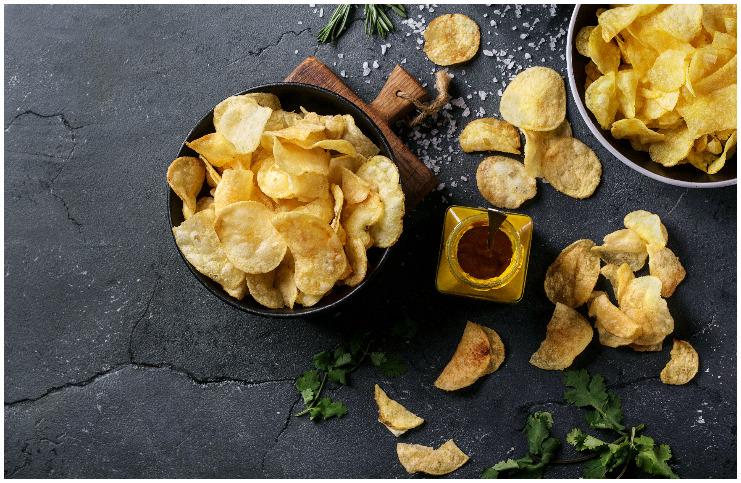Digestion is important for breaking down food into nutrients, that your body uses for growth, energy, and cell repair.
More than 90 percent of the people in the United States suffer from everyday digestion problems such as bloating, gas, constipation, stomach pain, fatigue, and heartburn after eating.
Here Are Top 10 Digestive Destroyers – Foods And Drinks You Should Avoid:
#1 Junk Foods
These foods are highly refined and processed in such a way that they lose most of the essential nutrients, have poor water and low fiber content. In addition, junk foods usually contain ingredients or additives which might trigger IBS flare-ups.
Examples of junk foods include:
- potato chips;
- french fries;
- onion rings;
- cookies;
- cakes
- chicken nuggets;
- margarine;
- hamburgers;
- hot dogs;
- fried chicken;
- nachos;
- mayonnaise;
- pepperoni pizza;
- teriyaki chicken.
#2 Alcohol

For many adults, a glass of wine helps make food feel like it’s going down more smoothly. However, in regards to the gastrointestinal system, alcohol can be a trigger for gut inflammation and leaky gut syndrome.
#3 Vegetable Oils
Oils can be incredibly dense in the stomach and aren’t a whole food. Recent research has concluded that excessive consumption of Omega 6 Poly Unsaturated Fatty Acids, found in most commonly used vegetable oils, has a higher risk of inflammatory bowel disease and ulcerative colitis.
Moreover, regular use of vegetable oils in the diet may trigger stomach pain or diarrhea.
#4 Dairy products
Reducing or avoiding the intake of dairy products (such as cream, milk, and processed cheeses) lowers the symptoms of inflammatory bowel disease.
Cheese also has small amounts of mold spores, that can produce an allergic reaction if you’ve been diagnosed with a mold allergy. Another adverse effect of dairy products is milk protein allergy, in which your immune system produces antibodies against these proteins.
#5 Energy Drinks
Not everyone who consumes energy drinks develops irritation of the lining of the stomach, however, if you do, you’ll experience symptoms like – pain, inflammation, bleeding, and ulcerations in the stomach area and small intestine.
#6 Caffeine
It could be problematic especially for people with chronic digestive problems. Additionally, patients with IBD, IBS, or leaky gut also have adrenal problems.
Caffeine is also acidic, thus, it increases the number of gastric secretions and acidity levels. This ultimately leads to irritation of the intestinal lining.
#7 Artificial Sweeteners
Eating foods or drinks that contain sugar alcohols is likely to cause cramping, gas, and bowel dysfunction. These types of foods are usually labeled with a warning and cautions against eating a large amount.
#8 Eggs
During digestion, your small intestine produces specific enzymes used to break down the proteins in eggs. Nevertheless, if you lack the appropriate enzymes to break down these proteins, you can experience vomiting, nausea, bloating, gas, cramping, and diarrhea.
Note – egg intolerance does not affect the immune system and will most likely not affect other parts of the body aside from the gastrointestinal system.
#9 Gluten
Gluten is a protein complex made up of glutenin, gliadin, and starch. Gluten is found in a few grains, like – wheat (including wheat varieties like kamut, spelt, and durum), rye, barley, and triticale.
The biggest concern when consuming foods that contain gluten is the celiac disease (1 percent of people have this condition), an autoimmune reaction provoked by gluten and treatable with a gluten-free diet. Gluten exposure in celiacs causes the immune system to attack both the gluten as well as the intestinal wall itself.
#10 Spicy Foods
Spicy foods have many health benefits, however, in some sensitive individuals, they can irritate the esophagus, leading to indigestion and painful heartburn.
Note – spicy foods are especially dangerous for your digestive system when you eat them close to bedtime.
Tips To Improve Your Digestion Naturally
- drink plenty of fluids throughout the day, but avoid drinking too many fluids when eating.
- soak legumes before cooking.
- eat slowly and ensure you are properly chewing your food. When you chew your food well, it eases the work required from your digestive system, therefore, your body can focus on other tasks instead.
- daily moderate exercise helps keep foods moving through your digestive system, reducing the chance to develop constipation. In addition, physical exercise can help you maintain a normal BMI, which is excellent for your digestive health.
- eat regular meals during the day to help move food through your digestive system. Take time to eat even if you are having a busy day.
- Consumption of high-fiber foods will help to ease your digestion and keep it regular. Foods high in dietary fiber – grapes, cherries, zucchini, bell peppers, oat bran, green peas, apples, sweet potatoes, potatoes, bananas, raspberries, plums, carrots, chia seeds, flax seeds, and almonds.
References http://www.nhs.uk/Livewell/digestive-health/Pages/digestive-health.aspx https://www.ncbi.nlm.nih.gov/pubmed/11151864


Basically dont eat anything!
Not really! Eat fruits, vegetables, seeds, legumes, and nuts, and your stomach will be healthy.